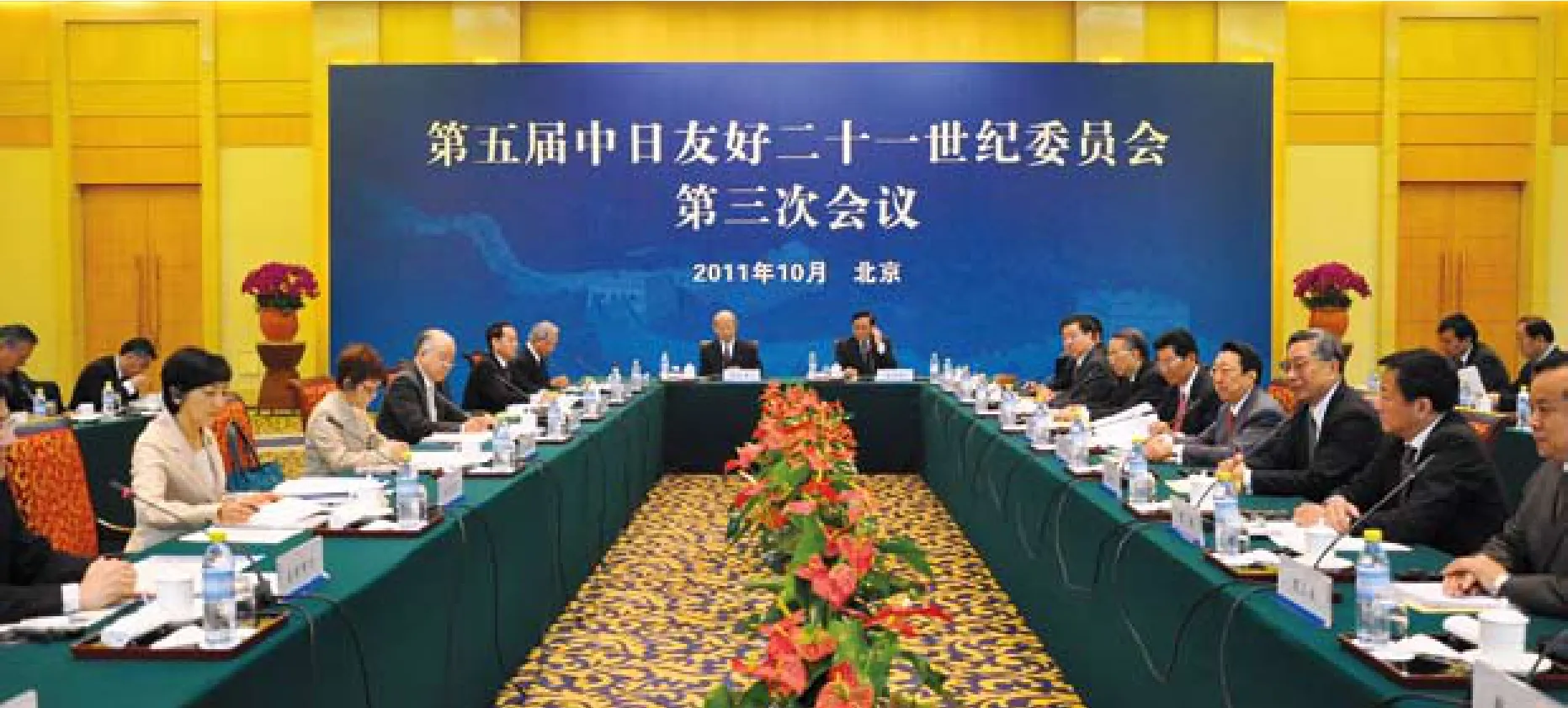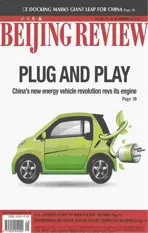Getting Reacquainted
2011-10-14ByMIAOXIAOYANG
By MIAO XIAOYANG
Getting Reacquainted
By MIAO XIAOYANG
China and Japan seek to foster mutual understanding to improve a sometimes difficult relationship
At a time when China and Japan are about to celebrate their fourdecade-long diplomatic ties, the two countries should strengthen cooperation in diverse fi elds while fostering good feelings toward each other, said Tang Jiaxuan, a former Chinese State Councilor.
Next year will mark the 40th anniversary of the normalization of diplomatic relations between China and Japan. “This will be a new milestone in the history of bilateral relations and will provide new and significant opportunities for the development of bilateral relations,” Tang, chair of the Chinese delegation, said at the third meeting of the Fifth 21st Century Committee for China-Japan Friendship.
The 21st Century Committee for China-Japan Friendship, established in 1984, is an advisory body for the two countries’ governments. It consists of eminent personalities from different communities of the two countries.
Committee members agreed during the meeting, held on October 23-25 in Beijing and Changsha that it is imperative that China and Japan, neighbors often troubled by historical disputes and clashes over practical interests,enhance mutual understanding and trust.
Building trust
A lack of political trust and friendly emotions continues to haunt Sino-Japanese relations, Tang said. Bolstering political trust and enhancing friendship will therefore be two “systematic programs” the two countries should jointly advance.
Complicated factors, including historical issues and nationalist sentiments, have led to insuf fi cient mutual political trust between China and Japan. The Chinese are indignant at Japanese right wing’s attempts to whitewash wartime history. Disputes over the sovereignty of the Diaoyu Islands in the East China Sea also fl are up from time to time.
Also, some Japanese have suspicions about China’s rapid development and national defense modernization. They have touted the so-called “China threat theory,” which is detrimental to the sound development of bilateral relations.
Taizo Nishimuro, former President of the Tokyo Stock Exchange and chair of the Japanese delegation, said China and Japan should increase communication at various levels to promote mutual trust in political and security affairs for the long-term and stable development of bilateral relations.
During Chinese President Hu Jintao’s state visit to Japan in 2008, the two sides issued a fourth political document, which stated that the two countries “are partners and do not constitute a threat to each other” and they will“support each other’s peaceful development.”
The two sides should strengthen dialogue and exchange between various sectors including governments, political parties and parliaments to implement this important political consensus, Tang said.
Zhou Mingwei, President of the China International Publishing Group (CIPG), said to establish mutual political trust, the two sides must push for a shift in people’s thinking.
Enhancing friendship
To enhance friendship among Chinese and Japanese people, China and Japan should give full play to their unique advantages such as geographical proximity and cultural similarity and actively expand personnel exchanges by mobilizing both governmental and non-governmental resources, Tang said.
“The two sides should work together to create an objective and friendly public opinion environment,” he added. “The media of both countries should strengthen exchanges, increase mutual understanding, enhance the sense of responsibility, avoid malicious speculation and serve as a bridge for the improvement and development of bilateral relations.”
Zhou said social elites, opinion leaders and media of both sides have the responsibility to help the Chinese and Japanese governments and people adopt a reasonable attitude toward Sino-Japanese relations. In other words, when friction breaks out, the two countries should give top priority to their overall relationship, and shouldn’t let problems in certain aspects in fl uence the overall development of their relationship.

ADVISORY PANEL:Committee members attend the third meeting of the Fifth 21st Century Committee for China-Japan Friendship in Beijing on October 23

CALLS FOR COOPERATION: Chinese Premier Wen Jiabao meets Taizo Nishimuro,chair of the Japanese side of the Fifth 21st Century Committee for China-Japan Friendship, in Beijing on October 22
They should also guide public opinion in a positive direction, rather than playing up negative reports, he said.
For instance, over 60 percent of Chinese and nearly 80 percent Japanese respondents in a recent poll in both countries sponsored byChina Dailyand Japanese non-pro fi t think tank Genron NPO said they did not have favorable opinions of the other country.
If viewed in a positive light, the poll can help Chinese and Japanese people realize the urgency and importance of enhancing friendship, Zhou said. But if approached negatively,it may magnify unconstructive factors in Sino-Japanese relations.
The media are obligated to present China and Japan truthfully to the general public,said Hiroko Kuniya, a well-known NHK announcer. Unfortunately, the two countries’national images portrayed by the media are often shaped by nationalism.
Boosting cooperation
“Post-disaster reconstruction remains at the top of the Japanese Government’s agenda,” said Wei Jiafu, Chairman of the Board of the China Ocean Shipping (Group)Co. “There will be huge demand for cement,construction machines, and agricultural products in Japan.”
China will provide massive assistance,such as building materials, labor services,consumer goods and food, for Japan during its post-disaster reconstruction, and cooperation will grow as reconstruction continues, he said.
Hiroshi Yoshikawa, a professor with the University of Tokyo, said the negative impact from the March 11 earthquake and tsunami on Japan’s industry will be temporary.
Japan successfully recovered from the 1923 Tokyo earthquake, which was more devastating than this year’s earthquake. “The earthquake will not adversely influence bilateral economic cooperation; instead, Sino-Japanese economic ties will be even stronger in the future,” said Yoshikawa.
At a meeting with members of the Fifth 21st Century Committee for China-Japan Friendship in Beijing on October 24, Chinese Foreign Minister Yang Jiechi said the Sino-Japanese relationship has gone smoothly since the new Japanese cabinet was formed in September, and now is a precious opportunity to develop the bilateral relationship.
Nishimuro said it was time to encourage Japanese Foreign Minister Koichiro Gemba and Prime Minister Yoshihiko Noda to visit China as soon as possible.
He said China has made great efforts to boost the bilateral relationship since Japan’s earthquake and Japan should also do something. Chinese Premier Wen Jiabao visited disaster-hit regions in Japan in May to demonstrate China’s support for Japan’s reconstruction efforts before attending the fourth trilateral summit of China, Japan and South Korea in Tokyo.
Nishimuro said the Japanese cabinet led by Noda is a “creative cabinet.” He hoped Noda would be cautious and avoid making comments that might cause misunderstandings.
Tang said he hoped Noda would be an“Asia-oriented politician” willing to push forward mutually bene fi cial cooperation with China and other Asian nations.
